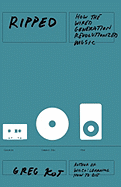
Ripped: How the Wired Generation Revolutionized Music by Greg Kot, music critic for the Chicago Tribune and co-host of NPR show Sound Opinions, is an excellent study of how the music industry has changed during the past decade.
Kot begins by discussing the state of the industry before the Internet: payola exchanged to get radio airplay; the increasing tendency for labels to look for a "hit" to move product instead of allowing artists' careers to develop; and the overall dominance of the major music labels. This began to change when artists such as Prince abandoned the major label system and began making distributing music through their own label, and, more importantly, with the development of the Internet.
Kot begins by discussing the state of the industry before the Internet: payola exchanged to get radio airplay; the increasing tendency for labels to look for a "hit" to move product instead of allowing artists' careers to develop; and the overall dominance of the major music labels. This began to change when artists such as Prince abandoned the major label system and began making distributing music through their own label, and, more importantly, with the development of the Internet.
Kot recounts the major music stories of the late 1990s and 2000s, including the rise and fall of Napster, the RIAA's court battles with consumers accused of illegal downloading, and the development of iTunes. This is framed within studies of bands such as Bright Eyes, Radiohead, and Wilco who have used the Internet to tremendous advantage to market their music.
One of the more important discussions is the influence that music blog and review sites such as Pitchfork play in the role of shaping a band's fortunes. For some, such as Arcade Fire, this has led to tremendous success. For others, such as Black Kids, whose initial EP was lauded by Pitchfork but whose album was panned with a one word review, this flavor-of-the-month celebrity can come at the expense of a band not yet ready for playing sold out shows at 2,000 seat venues.
Ripped is a great read for anyone looking into the recent history of the music industry. Those interested in music from the 1990s and 2000s, especially those who like indie rock, will also find much to love. Additionally, this is an excellent book for people whose industries are being affected by the new content distribution model which the Internet has made possible. By learning from the pitfalls of the music industry, industries where change is happening rapidly can be better prepared for the future.
